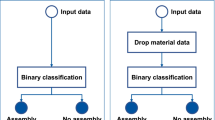Abstract
Advanced capabilities in artificial intelligence pave the way for improving the prediction of material requirements in automotive industry applications. Due to uncertainty of demand, it is essential to understand how historical data on customer orders can effectively be used to predict the quantities of parts with long lead times. For determining the accuracy of these predications, we propose a novel data mining technique. Our experimental evaluation uses a unique, real-world data set. Throughout the experiments, the proposed technique achieves high accuracy of up to 98%. Our research contributes to the emerging field of data-driven decision support in the automotive industry.
Access this chapter
Tax calculation will be finalised at checkout
Purchases are for personal use only
Similar content being viewed by others
References
Lee, J., Lapira, E., Yang, S., Kao, A.: Recent advances and trends in predictive manufacturing systems in big data environment. Manuf. Lett. 1(1), 38–41 (2013)
Ghabri, R., Hirmer, P., Mitschang, B.: A hybrid approach to implement data driven optimization into production environments. In: Abramowicz, W., Paschke, A. (eds.) BIS 2018. LNBIP, vol. 320, pp. 3–14. Springer, Cham (2018)
Renzi, C., Leali, F., Cavazzuti, M., Andrisano, A.O.: A review on artificial intelligence applications to the optimal design of dedicated and reconfigurable manufacturing systems. Int. J. Adv. Manuf. Technol. 72, 403–418 (2014)
Dremel, C., Herterich, M.M., Wulf, J., Waizmann, J.-C., Brenner, W.: How AUDI AG established big data analytics in its digital transformation. MIS Quart. Exec. 16(2), 81–100 (2017)
Leukel, J., Jacob, A., Karaenke, P., Kirn, S., Klein, A.: Individualization of goods and services: towards a logistics knowledge infrastructure for agile supply chains. In: Proceedings of the AAAI Spring Symposium (2011)
Widmer, T., Premm, M., Kirn, S.: A formalization of multiagent organizations in business information systems. In: Abramowicz, W., Alt, R., Franczyk, B. (eds.) BIS 2016. LNBIP, vol. 255, pp. 265–276. Springer, Cham (2016)
Meyr, H.: Supply chain planning in the German automotive industry. OR Spectr. 26, 447–470 (2004)
Lee, H.L.: Aligning supply chain strategies with product uncertainties. Calif. Manag. Rev. 44(3), 105–119 (2002)
Baeza-Yates, R., Ribeiro-Neto, B.: Modern Information Retrieval, 2nd edn. ACM Press, New York (1999)
Takeishi, A., Fujimoto, T.: Modularization in the auto industry: interlinked multiple hierarchies of product, production and supplier systems. Int. J. Automot. Technol. Manage. 1(4), 379–396 (2001)
Yoo, Y., Boland, R.J., Lyytinen, K., Majchrzak, A.: Organizing for innovation in the digitized World. Organ. Sci. 23(5), 1398–1408 (2012)
Kurbel, K.E.: MRP: material requirements planning. In: Swamidass, P.M. (ed.) Enterprise Resource Planning and Supply Chain Management, pp. 19–60. Springer, Heidelberg (2013)
Gupta, A., Maranas, C.D.: Managing demand uncertainty in supply chain planning. Comput. Chem. Eng. 27(8–9), 1219–1227 (2003)
Zorgdrager, M., Curran, R., Verhagen, W., Boesten, B., Water, C.: A predictive method for the estimation of material demand for aircraft non-routine maintenance. In: 20th ISPE International Conference on Concurrent Engineering (2013)
Lee, Y.Y., Kramer, B.A., Hwang, C.L.: Part-period balancing with uncertainty: a fuzzy sets theory approach. Int. J. Prod. Res. 28(10), 1771–1778 (1990)
Du Chih-Ting, T., Wolfe, P.M.: Building an active material requirements planning system. Int. J. Prod. Res. 38(2), 241–252 (2000)
Steuer, D., Korevaar, P., Hutterer, V., Fromm, H.: A similarity-based approach for the all-time demand prediction of new automotive spare parts. In: 51st Hawaii International Conference on System Sciences (HICSS 2018), pp. 1525–1532. Waikoloa Village (2018)
Salton, G., Wong, A., Yang, C.S.: A vector space model for automatic indexing. Commun. ACM 18(11), 613–620 (1975)
Manning, C.D., Ragahvan, P., Schutze, H.: An Introduction to Information Retrieval. Cambridge University Press, Cambridge (2009). Online ed
McCallum, A., Nigam, K.: A comparison of event models for naive Bayes text classification. In: 15th National Conference on Artificial Intelligence (AAAI 1998): Workshop on Learning for Text Categorization, pp. 41–48, Madison (1998)
Joachims, T.: Text categorization with support vector machines: learning with many relevant features. In: Nédellec, C., Rouveirol, C. (eds.) ECML 1998. LNCS (LNAI), vol. 1398, pp. 137–142. Springer, Heidelberg (1998)
MacQueen, J.: Some methods for classification and analysis of multivariate observations. In: 5th Berkeley Symposium on Mathematical Statistics and Probability, vol. 1, pp. 281–297. University of California Press, Berkeley (1967)
Xu, D., Tian, Y.: A comprehensive survey of clustering algorithms. Annals Data Sci. 2(2), 165–193 (2015)
Riekert, M., Leukel, J., Klein, A.: Online media sentiment: understanding machine learning-based classifiers. In: 24th European Conference on Information Systems (ECIS 2016), Istanbul (2016)
Tu, Q., Vonderembse, M.A., Ragu-Nathan, T.S., Ragu-Nathan, B.: Measuring modularity-based manufacturing practices and their impact on mass customization capability: a customer-driven perspective. Decis. Sci. 35(2), 147–168 (2004)
Acknowledgements
This work has been partially supported by the Federal Ministry of Economic Affairs and Energy under grant ZF4541001ED8. We would like to thank Hansjörg Tutsch for his valuable comments on earlier versions of this paper. We also thank Lyubomir Kirilov for helping to develop and improve parts of this paper.
Author information
Authors and Affiliations
Corresponding author
Editor information
Editors and Affiliations
Rights and permissions
Copyright information
© 2019 Springer Nature Switzerland AG
About this paper
Cite this paper
Widmer, T., Klein, A., Wachter, P., Meyl, S. (2019). Predicting Material Requirements in the Automotive Industry Using Data Mining. In: Abramowicz, W., Corchuelo, R. (eds) Business Information Systems. BIS 2019. Lecture Notes in Business Information Processing, vol 354. Springer, Cham. https://doi.org/10.1007/978-3-030-20482-2_13
Download citation
DOI: https://doi.org/10.1007/978-3-030-20482-2_13
Published:
Publisher Name: Springer, Cham
Print ISBN: 978-3-030-20481-5
Online ISBN: 978-3-030-20482-2
eBook Packages: Computer ScienceComputer Science (R0)




